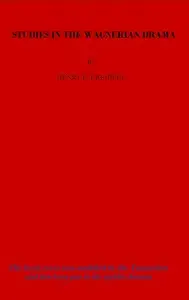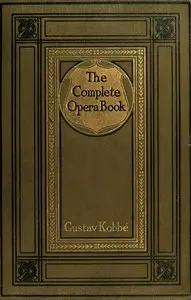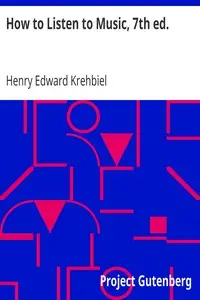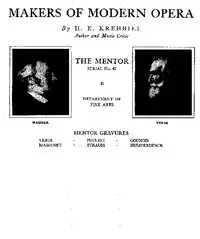"A Book of Operas: Their Histories, Their Plots, and Their Music" by Henry Edward Krehbiel is a wide-ranging exploration of opera that concentrates on important musical pieces and how they became popular over time, written in the late 1800's. It is a look at the stories, people, composers, and important shows of well-known operas, making clear how their complicated stories and music have changed and become accepted in different cultures. The book begins by explaining the story of Italian opera in America, starting with the important show of Rossini's "Il Barbiere di Siviglia." This part shows the problems and wins during its start, including early failures and later success, while telling about the important parts played by singers and composers. A close look at "Il Barbiere di Siviglia" uncovers its story's workings, character reasons, and Rossini's cleverness in the music, often thinking about how the work has been understood and changed over the years, showing Krehbiel’s skill in connecting music ideas with real performance history.

A Book of Operas: Their Histories, Their Plots, and Their Music
By Henry Edward Krehbiel
Step into the vibrant world of opera, where tales of love, loss, and triumph intertwine with masterful compositions that have resonated across generations.
Summary
About the AuthorHenry Edward Krehbiel was an American music critic and musicologist who was the chief music critic of The New York Tribune for more than forty years. Along with his contemporaries Richard Aldrich, Henry Theophilus Finck, W.J. Henderson and James Huneker, Krehbiel is considered part of the 'Old Guard', a group of leading New York–based music critics who first established a uniquely American school of criticism. A critic with a strong bend towards empiricism, he frequently sought out first hand experiences, accounts and primary sources when writing; drawing his own conclusions rather than looking to what other writers had already written. A meliorist, Krehbiel believed that the role of criticism was largely to support music that uplifted the human spirit and intellect, and that criticism should serve not only as a means of taste making but also as a mode to educate the public. His book How to Listen to Music was widely used as an instructional guide by the music consuming public in the United States during the last years of the 19th century and first several decades of the 20th century.
Henry Edward Krehbiel was an American music critic and musicologist who was the chief music critic of The New York Tribune for more than forty years. Along with his contemporaries Richard Aldrich, Henry Theophilus Finck, W.J. Henderson and James Huneker, Krehbiel is considered part of the 'Old Guard', a group of leading New York–based music critics who first established a uniquely American school of criticism. A critic with a strong bend towards empiricism, he frequently sought out first hand experiences, accounts and primary sources when writing; drawing his own conclusions rather than looking to what other writers had already written. A meliorist, Krehbiel believed that the role of criticism was largely to support music that uplifted the human spirit and intellect, and that criticism should serve not only as a means of taste making but also as a mode to educate the public. His book How to Listen to Music was widely used as an instructional guide by the music consuming public in the United States during the last years of the 19th century and first several decades of the 20th century.















